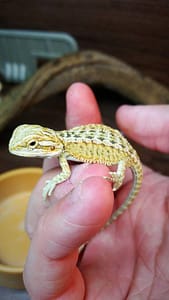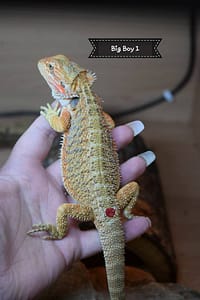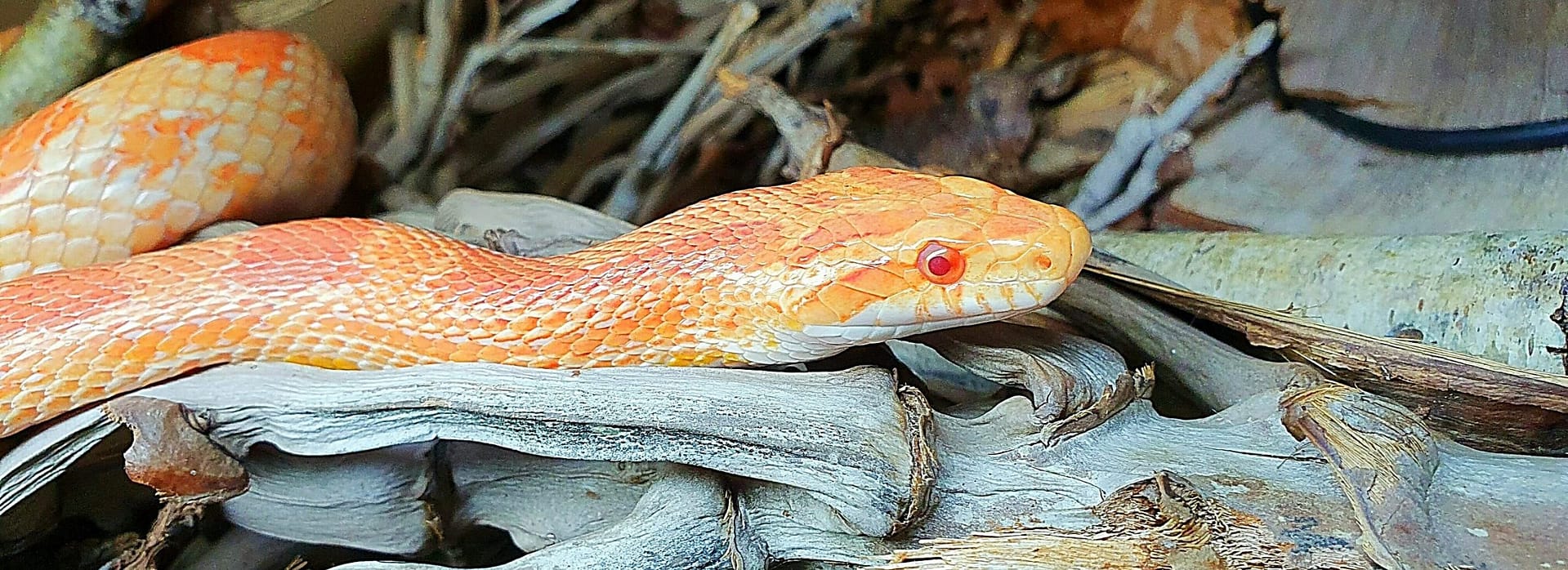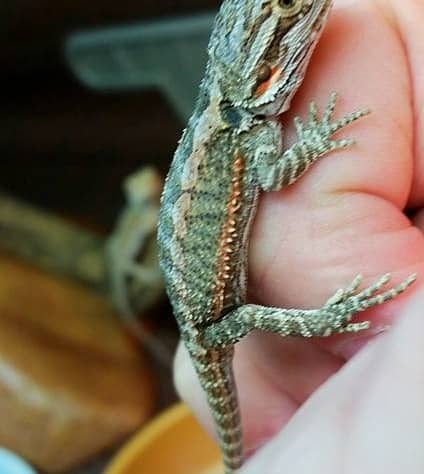*This post is an expansion regarding one of my own posts I often refer to in my Bearded Dragon group a couple of years ago. Still, such a common problem*
It happens so much in the various social media avenues I’m in. Be it Facebook, Instagram, Reddit, or YouTube. I see it daily.
Right…..let’s go over a few things to look for, and, reasons why you shouldn’t take home that tiny little dragon.
Cute often wins, unfortunately.
I would definitely recommend getting a dragon that is no less than 12 weeks old (3 months) old

One of the more common reasons I’m presented with upon asking “why did you buy this tiny little dragon?” is, “because it was so little and cute“.
And of course, that answer is not wrong regarding the cuteness. Something so small and delicate could win the heart of even the most hardened reptile hater.
Unfortunately though, this is not the time you should be developing a conscience because “it’s so tiny and cute”.
You need to look past the initial cuteness, and at that overall long-term health and well-being of the animal.
But other common issues would be,
- The buyer is lied to about the age by the Store or Breeder.
- The store assistant has no idea on the actual age.
- That dragon IS a good age (3 months+), but extremely undernourished (more on this later).
You then link the above potential issues with the fact most people will purchase a “kit” type set-up, with most of the contents being woefully inadequate, you can see why it’s such a problematic potential death sentence.
So, what good things do you look for?
I would definitely recommend getting a dragon that is no less than 12 weeks old (3 months) old. And there a multitude of reasons for such.
- At 3 months old they should have a steady weight gain.
- Be very active.
- Very alert.
- Good feeding regime for you to carry on.
- Eating greens daily.
- Have good fats and muscle development around the arms & legs, even at this young age.
- And more often than not, be averaging around several inches in length.
- And it’s the only time them being housed with other dragons is extremely important (their clutch mates).
They will develop competition for food. So should literally eat everything. Greens included. And with all that, they gain Confidence. - Any good breeder or shop/store wouldn’t let a dragon be sold until that 3-month plus milestone is reached anyway.
If you are being told your future purchase is 3 months plus old. Yet looks thin. Is the size of an adult index finger. Whole body fits in the palm of your hand. Hiding. Inactive. Any of these……. Do NOT purchase or take that dragon home, regardless of what you are being told.
This dragon is either way too young to be sold. Or, extremely undernourished in food and/or vital heat/UVB/supplement exposure, thus, growth has been severely effected.
The first 6 months of growth is vital. This is the rapid fast growth stage. Growth slows after this period till around 12 months, and at that age they are pretty much full-grown. There will be a little more growth up until around 18 months. But not much.
But those first six months, every meal contributes to body and organ growth and development. But all that eating is next to useless if even one of the above mentioned factors are under supplied (heat, UVB, food, supplements).
Any growth lost in this vital first 6 months is never miraculously regained under the perfect care. The hindering damage is done here, so to speak, and irreversible.
Eating those greens.
Even babies should be eating their greens. If you are being told that they don’t eat greens until 6 months, or a year old, or whatever, that person is talking nonsense.
My dragons will eat greens from week one of birth. You get them eating greens as their first daily meal, and they will see greens as a vital meal. And not a secondary food source. You then feed 2/3 live-feeds throughout the day (feeding for 5min only. 15mins is way too much).
With the greens being eaten at such a young age, it makes the job of feeding them far easier for the new keeper once that dragon has a new home.
And of course, eating greens is a vital part of their nutrition and body function or which live-food doesn’t provide.
Here, some of my own bred baby dragons, eating greens.
Clutch mates.
In the past 15 to 20 years, can’t say I’ve had any issues at all using the method of small clutches together
This is the only time I’d ever “thumbs up” the use of 5 or 6 dragons together in the same setup.
Up until around 3 months old, due to being housed together the dragons will gain vital experience. It kind of kick-starts their survival instinct, and they will literally eat due to the competition for food. Bask due to the competition for the best basking areas. Etc, etc. Something which In my experiences is lacking when these underage dragons are removed from this environment to early.
Of course, dominant behaviour happens from day 1 of life. Its up-to the breeder to keep an eye of things in case of any fighting issues.
But I can honestly say, in the 100’s of dragons I’ve bred over the years. Incidents have been only a handful. And these were early on in my breeding experience.
In the past 15 to 20 years, can’t say I’ve had any issues at all using the method of small clutches together (batches of 6, large basking zones, and a few other things. I’ll make a separate post regarding this…..maybe)
A common tragedy.
In my experiences via the various media outlets I’m in, the end more often than not is death for the dragon, and a world of heartache for the keeper.
Taking any animal away from a common surrounding is a stressful event for that animal. Healthy or not.
Of course, a healthy animal can cope with such stress far better.
More often than not, taking that tiny dragon home leads to heartbreak for the new keeper.
A sickly, fussy, inactive and stressed dragon, which at such a young age will be detrimental.
- Stress = not eating.
- Not eating = malnutrition.
- Malnutrition = inactivity.
- Inactivity = illness, and more often than not. Death when they are so young.
Baby/young dragons should be ferocious eaters. Devouring bugs and greens at will.
But unfortunately it’s a very common issue when the dragon is way too young to have been sold for that dragon to not eat. Hide away. Become weak. Thus, health quickly deteriorates.

So if you see a tiny skinny dragon. It’s probably very young indeed. Only a couple of weeks old at most. And to save the heartache, never to be taken at this age.
Or if it’s skinny and small. Inactive. It’s probably already sick. Or has very bad genetics.
Again. Do not take this dragon.
Moving that young and/or undernourished dragon, thus causing huge stress, will ultimately be its end.
In my experiences via the various media outlets I’m in, the end more often than not is death for the dragon, and a world of heartache for the keeper.
Is it always a sad end?
Of course this is not always the case. There are some lucky keepers that manage to pull their dragon through. Good strong genetics, and keeper knowledge and experience helps here. With that being said, if you are experienced, then I’d hope you’d avoid such anyway.
Conclusion.
All I ask is, please please please ask the age of the dragon before you consider taking one home. And keep all the above mentioned in mind.
Don’t jump in and purchase the 1st dragon you see because it’s cute.
Shop around. Ask around. Find a breeder or store that has a proven track record raising baby dragons that have grown up, and now a good few years old
Find a fit, young, alert, healthy dragon.
Your life and theirs will be filled with much more happiness, and not early heartache.
If the whole of that dragon fits in the palm of your hand, it’s way too young, or sick. Definitely don’t take this dragon.
If you have very recently got one of these small dragons, I’d honestly consider taking it back.
– Pete
Award winning Published author of Herpetoculture.
Featuring articles on many species within,
Practical Reptile Keeping magazine (some linked on site as .pdf files)
Canadian Hobbyist magazine
Reptiles magazine
Also, Reptile/Amphibian blog article writer and reptile specialist for;
Exotic Direct (links on this site)
Reptile Apartment
Public talker at Reptile meetings, for various organisations.
Founder of several huge Reptile and Amphibian related Facebook groups (links on this site)
Reptile Reports – “Lizard Personality of the year” 2016 & 2017



I would just like to get more information about bearded dragons I have two of them and in the updates I’m greatly interested
feel free to join my created facebook group http://www.facebook.com/groups/beardienetwork